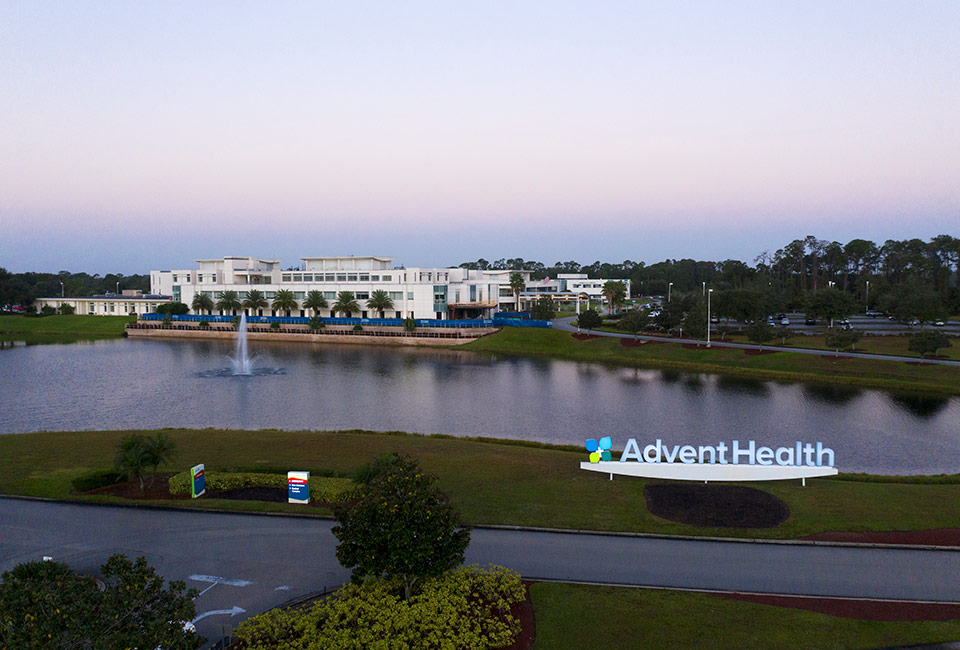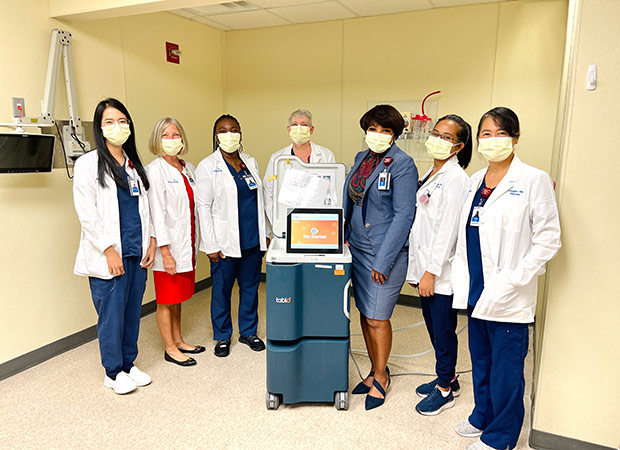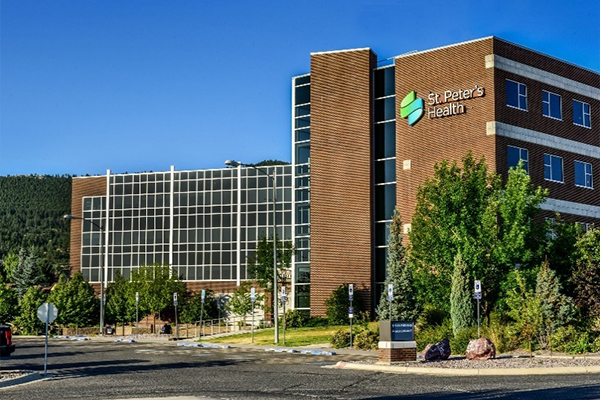Lessons from AdventHealth: How to Create a Resilient, Cross-Trained Dialysis Team

Summary
The AdventHealth locations in Sebring and Lake Placid in Florida have revamped their dialysis programs to a versatile in-house model, with new technology that offers any nurse the opportunity to learn dialysis.
How do you empower nurses in the complex area of renal care? For two busy AdventHealth hospitals in rural Highlands County, FL, the solution has involved a mix of forward-thinking leadership, conversion to new technology with an in-house program modeled after a sister facility, and a confident, flexible, cross-trained nursing team. For Elsie Graves, MHSA, BSN, RN, NEA-BC, Vice President and Chief Nursing Officer (CNO) for AdventHealth Sebring and AdventHealth Lake Placid, as well as a third small facility, the result has been a positive staff and patient experience, with some unexpected results along the way. Construction on a new dialysis suite at the Sebring facility is nearing completion as well.
This May, Graves was given the first opportunity of her 12-year CNO career to implement a dialysis program, along with her team, at 171-bed AdventHealth Sebring, the largest and busiest of the AdventHealth hospitals in the area and at 50-bed AdventHealth Lake Placid. Both hospitals serve a large population of geriatric and indigent patients, with growing demand for dialysis due to a high incidence of cardiovascular disease, diabetes, high blood pressure and other comorbidities that can lead to kidney disease and failure. The two dialysis programs fully converted from an outsourced care model to treating patients in-house using the Tablo® Hemodialysis System.
“Dialysis had always been an outsourced service for us, but we felt we could better serve our patients and give them a wonderful experience, with our own nurses,” says Graves. “AdventHealth is always looking for progressive ways to give patients the best possible care, using the best equipment. Bringing dialysis in-house was a great opportunity for us, and the Tablo machine along with the Outset team made it easy to transition into that service line.”
“Bringing dialysis in-house was a great opportunity for us, and the Tablo machine along with the Outset team made it easy to transition into that service line.” – Elsie Graves, MHSA, BSN, RN, NEA-BC
“I was concerned at first about ease of use with the new technology, and if specialized dialysis nurse staff would be needed,” Graves continued. “The Outset team demonstrated the system for us, and explained that any nurse, including those with no experience in dialysis, could be trained to use Tablo. They told us about other hospitals that had gone live with Tablo programs using trained progressive care unit (PCU) and med-surg nurses, and they were very successful. This gave us a lot of ideas for our own programs.”
“A sister facility, AdventHealth Ocala, had already switched over to Tablo,” she says. “Ocala is a larger hospital, and like us, is rural. We thought, if they could get nurses to transition to a new technology, and train to become dialysis nurses by using Tablo, then we felt very confident that we could do the same at Sebring and Lake Placid.”
Model Ocala Facility Inspires Transition
Nicolisea Hunt McGregor BSN, RN, Assistant Nurse Manager Renal Services and a nurse for 14 years, manages the AdventHealth Sebring and Lake Placid dialysis programs. She and Graves had first heard about Tablo in 2021, from their sister facility AdventHealth Ocala, during COVID-19 pandemic surges in their state. Graves, Hunt McGregor and their team were interested in learning more about the Ocala team’s successful program, so they journeyed 150 miles north to see for themselves.
“It was an amazing experience. We learned more about the machine, how to troubleshoot, and just saw the Tablo machine in action and how simple it was to use,” says Hunt McGregor. “I was able to compare how easy Tablo was, to other more complex machines I have used. I found it to be very user friendly and easy to grasp. I was excited to get back to Sebring/Lake Placid and start our own dialysis program.” The team did their hands-on training at the Ocala campus, as well.
“I was able to compare how easy Tablo was, to other more complex machines I have used.” – Nicolisea Hunt McGregor BSN, RN
Keyword: Cross-Train
Once the decision was made to bring in a fleet of Tablo consoles at Sebring and Lake Placid, the team went through training on the new device, using Outset Medical’s online learning platform called Outset University. Hunt McGregor says that training was fast and went smoothly—and wasn’t limited to just the dialysis team.
“We were excited that the nurses who were cross-trained ended up liking dialysis,” says Hunt McGregor. “We actually had one nurse who was cross-trained from the ICU, who stayed in dialysis permanently. The others who have been cross-trained are still loving dialysis, and pick up shifts when they can, so that’s been great. It has given them additional skills, depth of knowledge and confidence, which is much needed in dialysis.”

“We’ve been able to cross-train our team members to continue that dialysis service, regardless of what time the patients come into the hospital, and then move them along their continuity of care to get them back out on their feet,” adds Graves.
“For anyone considering Tablo, you’ll be surprised to know that you can utilize the staff that you have by having them cross-trained,” adds Hunt McGregor. “You can then have Tablo-trained nurses working in different areas of the hospital, which helps to utilize your staff more flexibly and effectively.”
Exceeding Nephrologist Expectations
Graves and Hunt McGregor have received positive feedback from their nephrologists on the Tablo machines, especially with patient outcomes. “At first, they were concerned about the Tablo PIRRT [prolonged intermittent renal replacement therapy] treatments,” says Hunt McGregor. “But after we performed several cases and they saw the results, they were pretty pleased. Our Tablo treatment orders have increased, and we also do SLED [sustained low efficiency dialysis], isolated ultrafiltration and IHD [intermittent hemodialysis]. We have been very active.”
Graves recalled that one of their AdventHealth Sebring staff nephrologists, Fabio Oliveros, MD, in practice for more than 20 years using the same dialysis technology, found out that the two hospitals were going to transition to Tablo, and he was concerned. “He made a comment that stands out to me after we brought Tablo in, which was ‘I didn’t think it was going to go as smoothly as it went.’ He also had never seen a situation where a hospital has brought a service in-house and been able to keep up the quality of care, and satisfaction of patients and nephrologists. Now he’s a true believer.”
Doubling Capacity with a New Dialysis Suite
Growth in the already-busy Sebring dialysis program since bringing Tablo in-house propelled some space adjustments, and the hospital is putting the final touches on construction of a new six-bay dialysis suite.
“The new suite will allow us to be more efficient in dialyzing patients at the same time,” says Graves. “Previously we utilized a shared space which often spread out treatments later into the evening, and patients have less satisfaction with that schedule. Tablo has afforded us to work without a water treatment room, and that is huge.”
Graves says that creating a dialysis suite was not in the plans prior to bringing on Tablo. “We had always tried to increase the number of dialysis beds with our outsourced company, but it was problematic due to their hours of operation in comparison to what we actually needed. We felt that this new suite shows patients our commitment to making them feel whole. We’ve doubled the size of our ability to dialyze patients simultaneously. We will now have the ability to provide dialysis 24/7.”
Over the last several months, the AdventHealth Sebring and Lake Placid team has created a resilient, cross-trained in-house dialysis team, due to the ease of training and use of Tablo. And, its new dialysis suite will soon be ready to welcome patients.
“I would say that we have a great return on investment with Tablo. Our overall vision is to continue to provide dialysis service with Tablo at Sebring and Lake Placid, to the satisfaction of our patients, and to continue to grow our nurses’ capabilities,” says Graves.
ABOUT ADVENTHEALTH SEBRING, LAKE PLACID AND WAUCHULA
AdventHealth Sebring, AdventHealth Lake Placid and AdventHealth Wauchula consist of 222 beds in the Heartland Region. The three hospitals have a staff of more than 1,800 employees and 225 board-certified physicians caring for the Highlands and Hardee County communities. For more information, visit AdventHealthSebring.com.
Image at the top of this page: AdventHealth Sebring, Sebring, FL; used with permission
The views and opinions expressed herein represent the personal opinions of the facility staff, and do not represent the views or opinions of other persons, institutions or organization.

